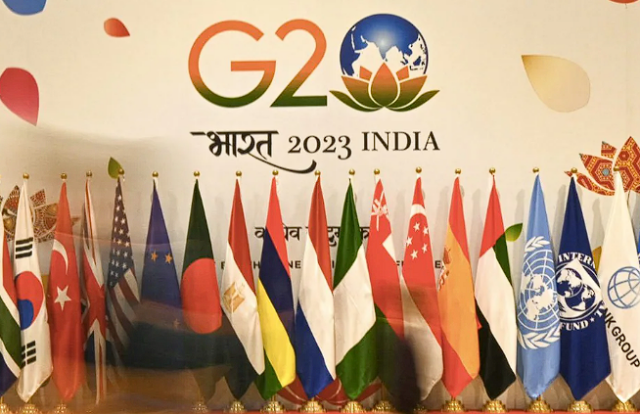NEW DELHI: Prime Minister Modi has made action on climate change a priority in the run-up to the G-20 summit. In a penned article in the Indian Express on India’s expectations from the G20 on Thursday, the prime minister stated that not only should “climate action be a complementary pursuit,” but that actions on climate action needed to be matched with actions “on climate finance and transfer of technology.”
He said a “global ecosystem” for clean hydrogen would be created with India serving as the hub for the production and supply. These efforts along with the introduction of the International Solar Alliance (ISA) in 2015 and the push for the Global Biofuels Alliance (GBA) where a coalition of 19 nations, which includes Brazil and the US, will work together to enhance global cooperation in the adoption of biofuels. Commenting on the initiative, the IEA stated that “global sustainable biofuels production would need to triple by 2030 to put the world’s energy system on track towards net zero emissions by 2050.”
The big question comes down to cost and whether members can agree on the roadmap ahead, the prognosis of which is gloomy. The absence of Chinese President Xi Jinping and Russian President Vladimir Putin may hinder climate talks along with the fact that earlier discussions have not paved the way for consensus at the summit level. In July, G20 environment ministers failed to agree on several key points on how to phase out fossil fuels, scaling up renewable energy to ensure greenhouse gas emissions peak by 2025 – a requirement that the Paris Agreement says is key to ensuring that global temperatures increase is limited to 1.5 degrees C. UN climate chief Simon Stiell has stated that the ministers’ statements on climate change in the run-up to the talks have been “woefully inadequate” and that geopolitics remains a “constraining factor” for any meaningful action.
The other big issue that would need to be tackled is that of finance. Both member nations along with multilateral organisations have continuously announced an increase in funds to tackle the problem. The most recent instance was that of the Asian Development Bank which recently announced that it would “scale up its ambition to deliver climate financing to its developing member countries to $100 billion over 2019–2030.”
Participants at the seminar however argued that money was not the main problem in tackling climate change. Sudipto Mundle, chairman of the Centre for Development Studies, has argued that the focus on climate change needed to concentrate on land and land use for which government intervention would be needed.
“For climate change, we would need to look at actionable policy measures which would require improving energy use which would require land. However, land especially in India is a very sensitive area. If you were to take land out of cropping and use it for ethanol production or for reforestation one would need huge policy levers,” he said, adding that the onus for this could not be borne by the government alone. The private sector would have to step in but how and what role they could play would have to be debated.
Monetek Singh Ahluwalia, former deputy chairman of the Planning Commission agrees that incentives need to be put in place if both people and institutions were to shift from coal to other forms renewable energy.
“Seventy per cent of India’s electricity comes from coal and the fact that we have to shift from coal to renewable energy is a no-brainer,” he said, “but the way we are doing it is pushing these other fuels through some kind of fiat onto discoms which will ruin them financially. We must then look at instruments such as introducing carbon tax on coal if we are to support this large-scale structural change. So far, no one has been talking about it.”
Ahluwalia also pointed out that when one considered renewables, one had to consider the practicalities of using them. “If you are going to switch to renewables, the bottom line of renewables is intermittency. If you are going to use pumped hydro-storage or by batteries the cost goes up. So, this assumption that renewables are cheap is no longer true since you have to bear the cost of battery storage.”
This then led to a larger point. “The question then is what are we going to do with the structure of the market? Are we going to continue with our present system? This is part of our Constitution where distribution is a state subject. The consensus so far has been that states handle distribution, and the Centre bails out states every five years if there are any shortfalls which is what has been done for the last 20 years. With this kind of structural change that we are talking about that will not be possible. So, we need to think, what are the corrective steps needed, to what extent would they be acceptable, and consistent with the Constitutional position.”
Hassled about being on the road in Delhi/ NCR with G20 restrictions in force? Mappls app will suggest alternate routes. A Made-in-India alternative to Google Maps with real-time route closure and diversion solutions in collaboration with Delhi Police.
Click on the link below
G20 – Delhi Controlled Zones Interactive Map
Related Links:
https://stratnewsglobal.com/
Traveller, bibliophile and wordsmith with a yen for international relations. A journalist and budding author of short fiction, life is a daily struggle to uncover the latest breaking story while attempting to be Hemingway in the self-same time. Focussed especially on Europe and West Asia, discussing Brexit, the Iran crisis and all matters related is a passion that endures to this day. Believes firmly that life without the written word is a life best not lived. That’s me, Ashwin Ahmad.





